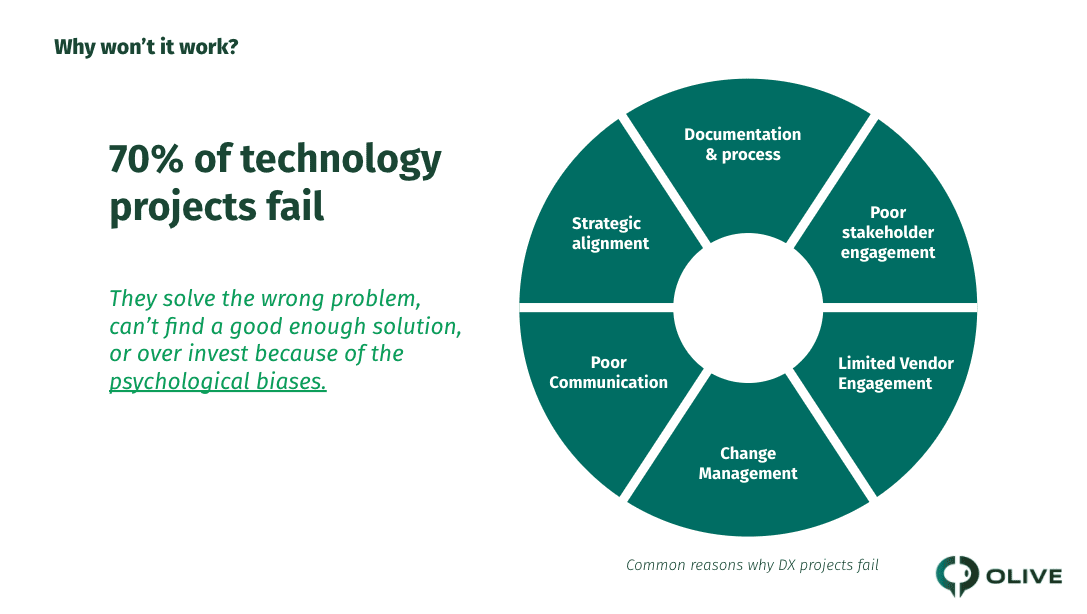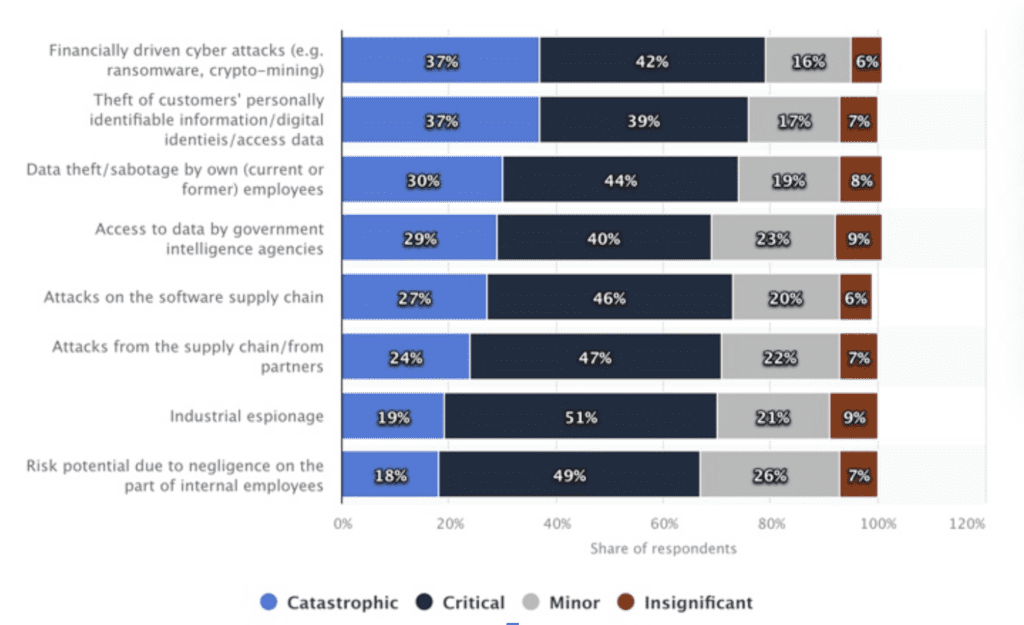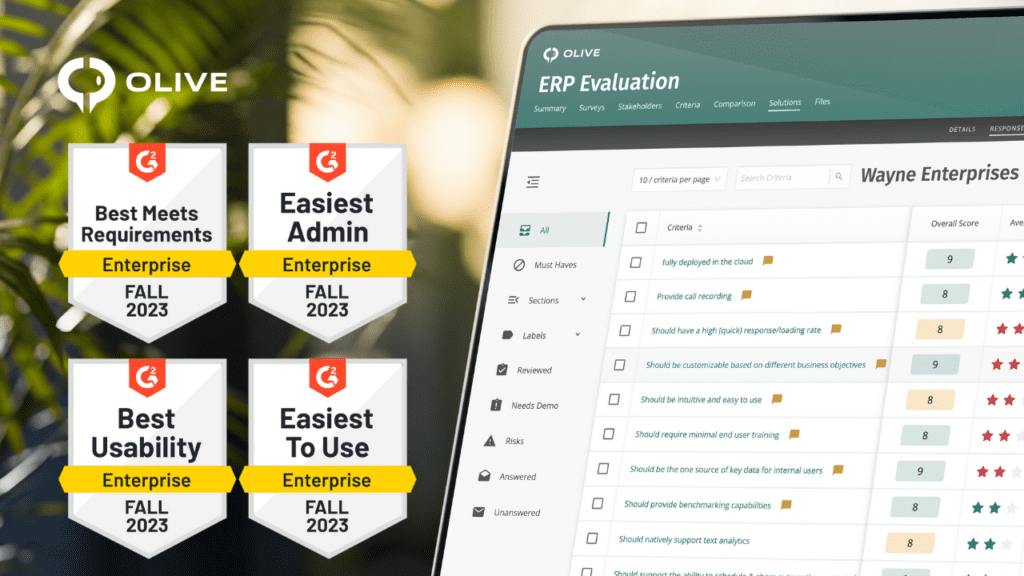When it comes to cybersecurity, sourcing the best solution or set of solutions for your business is a must. Not all cybersecurity solutions are created equal, but how do you know what you need and which solutions best suit your needs? Our guide explains how to vet cybersecurity solutions, the considerations you need to take on board for enterprise, and how to navigate the complex enterprise cybersecurity landscape.
What Cybersecurity Solutions are ‘Best’ for Enterprise?
There is no one-size-fits-all when finding the best-fit set of solutions for enterprise cybersecurity. However, some factors to consider include the size and complexity of the enterprise, its industry, the types of data it handles, and its cybersecurity risk profile. Hackers and fraudsters are always looking for unprotected targets, even small ones. So all companies need cybersecurity. But some industries require more sophisticated cyber protections than others. For example, an enterprise that relies on proprietary trade secrets or one that stores a lot of sensitive data on its customers and employees s requires a more comprehensive and sophisticated cybersecurity solution than others that do not. Similarly, an enterprise in a highly regulated industry also needs a more comprehensive solution.
Unfortunately, many enterprises rely on Magic Quadrant reports (provided for free by vendors whose solutions happen to be showcased in the magic quadrant relevant to their specific security market specialty). However, just because one solution did a great job for other organizations doesn’t mean that this will translate to meet your specific criteria. This is also assuming that you’ve already done the due diligence to figure out what type of security solutions you need. Rather than spending hours on Google and sifting through tens or hundreds of reviews or scouring websites for solutions that all claim they will solve all your security problems, consider using a platform that will do this for you.
Olive is an innovative solution that simplifies the process of sourcing enterprise technology as a team. With agile, digital, and collaborative features, Olive speeds up decision-making and allows multiple department heads to work together seamlessly.
How to Source the Best Cybersecurity Solutions for your Business
When sourcing the best enterprise security software for your organization’s needs, there are a few critical factors to consider. Let’s take a look at them below:
Step 1: Assess Your Cybersecurity Risks and Vulnerabilities:
Before deciding on your software, it’s important to evaluate your current risks and vulnerabilities. You can do this by using three different cybersecurity assessments:
- Asset Audit: An asset audit is helpful in analyzing your network components and determining your network endpoints, as well as establishing what data and software programs are on said endpoints, and what your overall network looks like. Solidifying this 360-degree, big picture view is essential to understand your risks and vulnerabilities.
- Risk Assessment: Here, you look at your network in detail to determine what risks you are vulnerable to. Establishing your biggest cybersecurity risks and what their impacts would be can be vital for prioritizing your cybersecurity efforts.
- Vulnerability Assessment: After determining what your biggest risk factors are, you now need to assess how well-protected your network is from lurking cyber threats. Here, you’ll assess certain areas, like out-of-date security patches in software, assess the level of cybersecurity awareness in your organization, and even run penetration tests that simulate attacks against your network to expose previously-undetected vulnerabilities.
Step 2: Consider Your Plans for Future Growth
You need to consider your scalability before sourcing your cybersecurity solution. Here, long-term thinking will get you far better results. For example, a scalable solution can grow along with your organization, whereas a non-scalable software can quickly lose efficacy or negatively impact your business performance as you scale for future growth. To help you make the right decision, consider your organization’s five year growth plan, and compare this to your preferred solution.
Step 3: Consider How the Data Security Solution Will Impact Your Regulatory Burdens
Many enterprises have to meet multiple regulatory standards for data security. Yet, these regulatory burdens may differ from one enterprise to the next. For example, many retail organizations have to follow the Payment Card Industry Data Security Standard (PCI DSS).
Whenever you’re assessing a data security solution, it’s critical to consider its implications on any of the regulatory standards that your business must adhere to. To preserve data in a secure environment, an SSL certificate that enables HTTPS on the browser is an essential protocol. SSL cert is also compatible and follows rules prescribed by PCI DSS authority. Your data remains secure while traveling between the server and the browser.
Step 4: Consider Your Existing Security Tools
Your new security solutions need to integrate with your existing data security measures. So before deciding on your software, ask yourself:
Is there already a data security tool that accomplishes a task that the new one is designed to address? If so, is the new security solution an improvement, and if yes, how so? If you already have an existing security tool that does the same job, the new tool may be a waste of money and resources. However, if support for the old security solution is being discontinued, then replacing it with an updated tool with similar functionality makes sense.
Step 5: Consider the User-Friendliness of the Solution
Adding a new data security solution can either enhance or detract from the user-friendliness of your business network. For example, the new security tool can negatively impact the user experience (UX) if it makes tasks more time-consuming for employee users. What’s more,
If you have customer-facing applications that run on your network, a negative UX experience can deter them. Because of this, it’s important to consider how the new data security solution will impact your current security procedures. Consider the following questions:
- Will the new solution add steps to or remove steps from my current security processes?
- How will the new security solution impact network performance (will it cause slowdowns or other issues that make logging into and using assets on the network more difficult/time-consuming)?
- How might employees try to work around the new security solution?
- What training might need to be implemented to familiarize employees with the new solution?
Ideally, you want to ensure that your new data security solution doesn’t impact your current security processes too severely and doesn’t put more pressure on your business network than your existing solutions. However, there may be occasions where you need to strike a balance between your need for security against the need for user-friendliness.
The above best practices can be easily achieved in Olive. Instead of trawling the web for security provider reviews, we do it all for you. We’re more innovative, collaborative, and accurate than RFI/RFQ or RFP processes, and we save you time and resources finding you a provider that matches your specifications. More about that here.
Step 6: Compare Cybersecurity Vendors to Your Business Needs
One of the hardest parts of finding a vendor is comparing their criteria to your business needs. It requires tons of collaboration, back-and-forth meetings, and spreadsheet after spreadsheet. We have you covered if you are looking for an easier, more streamlined way of comparing vendors to your business needs.
In Olive, you can collaborate with vendors within the project and not in emails or phone calls. You can manage and maintain vendor conversations within the app. Responses are automatically saved for traceability and due diligence. Our in-app chat allows stakeholders to review, score, and discuss vendor responses internally without meetings.
Due Diligence: Identify Cybersecurity Needs
The significance of identifying your cybersecurity needs before identifying a specific solution or solution space cannot be overstated. Your needs may require multiple types of solutions that a single vendor may or may not be able to provide. By specifying your security requirements in Olive, you will be able to quickly identify what types of solutions will meet those needs. Also, you will be able to identify your most critical needs so you can prioritize what solutions you should implement first and which ones will provide the most value with the least amount of cost and effort. The benefits of using Olive to do your due diligence in identifying your security requirements up front before considering, or even identifying any solutions or solution types are plentiful. So many enterprises end up implementing solutions before they identify their critical security needs. A great solution that doesn’t actually solve your main security problems is not a great solution for you. Conducting due diligence around your vendors’ cybersecurity offerings and how they can specifically address your security needs can circumvent future threats from occurring.

If vetting a long list of cybersecurity vendors sounds like your idea of hell, there is a solution to streamlining the process. With a typical RFI, you send a spreadsheet or document to a few vendors and hope for responses. With Olive, you can invite as many cybersecurity vendors as you want, that can span many aspects of cybersecurity, directly into the project. As they respond to your requirements and answer questions, you see the results and how well they score against your requirements and needs in real time. You can also identify the need for multiple types of solutions that may or may not be offered by one specific vendor. As you narrow down your solution list to find the best cybersecurity solution for your business needs, you can begin discussions on how easy it is to integrate the various vendors with solutions that meet your needs with each other, and within your enterprise.
Cybersecurity Considerations for Enterprise
Even if you have found your dream cybersecurity solution, you will still need to carefully consider their criteria and measure them against your organization’s goals. Let’s take a look at some considerations below:
- TCO: The cost of your chosen system involves more than the system expense itself. It includes licensing fees, hosting or hardware, implementation, maintenance, training, support, and upgrades.
- Organization size: The size of your business will determine your chosen solution, so consider this before making your choice.
- Organizational needs: Start by defining your needs. What are your biggest security concerns? What kind of data do you need to protect?
- End-users: Do you have a dedicated Security Operations Center (SOC) or will your IT team be responsible for managing incident and response. How comfortable with technology are your employees? Which functionalities will be most user-friendly for them? It’s important to remember your end-users before making your security software choice.
- Organization IT infrastructure: Does your organization operate mostly with a defined on-premise network, or do you operate mostly in the cloud. Do all of your employees work in the office or are many or all of them remote. What types of endpoints do you have? Do you have your own data centers? Do you have web or mobile applications available to customers? Where is that data stored? The answer to all of these questions will help identify what types of security solutions you need and which are the most critical.
Navigating the Enterprise Cybersecurity Landscape to Make the Best Choice
‘’The world of cybersecurity has changed drastically over the past couple of decades. We have evolved from a world of keystroke logging and trojans to a universe of full-fledged ransomware and cyber warfare.’’
- Philip Kushmaro, Contributor, CIO.
As malicious threats are becoming more prominent and perpetrators are finding new ways to scam, knowing how to navigate the modern landscape of enterprise cybersecurity is essential.

Improve Your Awareness
Even if you source the best cybersecurity solution(s) to help protect your organization, internal awareness of cyber scams is essential to keep your employees and customers safe. Consider building a comprehensive cybersecurity training program that is updated regularly. You can include information like how to create secure passwords, two-factor authentication, how to spot a phishing attack, how to avoid ransomware threats, and more. There are many vendors out there who provide cybersecurity training tools. You can use Olive to determine if you need to find an outside vendor for your training or if it is better to build these in-house.
Keep Your Infrastructure Up-to-date:
Your organization comprises multiple software components. Make sure that it is all updated so that the latest threats can’t permeate an unresolved vulnerability. Include a strategy plan to review your IT assets regularly to ensure they are patched, updated, and secured.
Find Your Organization’s Best Cybersecurity Solutions with Olive
Finding the best-fit cybersecurity shouldn’t have to be a struggle. Explore how you can easily leverage Olive’s benefits below:
Security Project and Requirements Template
With Olive, you can find the best enterprise security solutions for your needs in a streamlined and efficient manner, saving you time, money, and resources. Olive’s requirements management software helps you select requirements from pre-built templates or build your own. Olive has project and requirements templates to kick off your project and requirements-gathering process, no matter the complexity of the security software you are looking for.
Unbiased Security Vendor Selection
Olive does not charge vendors. We facilitate vendor-neutral decisions based on what you need, not what vendors are selling or subjective reviews. Olive allows you to invite vendors to respond to requirements without revealing the identity of your client or business.





